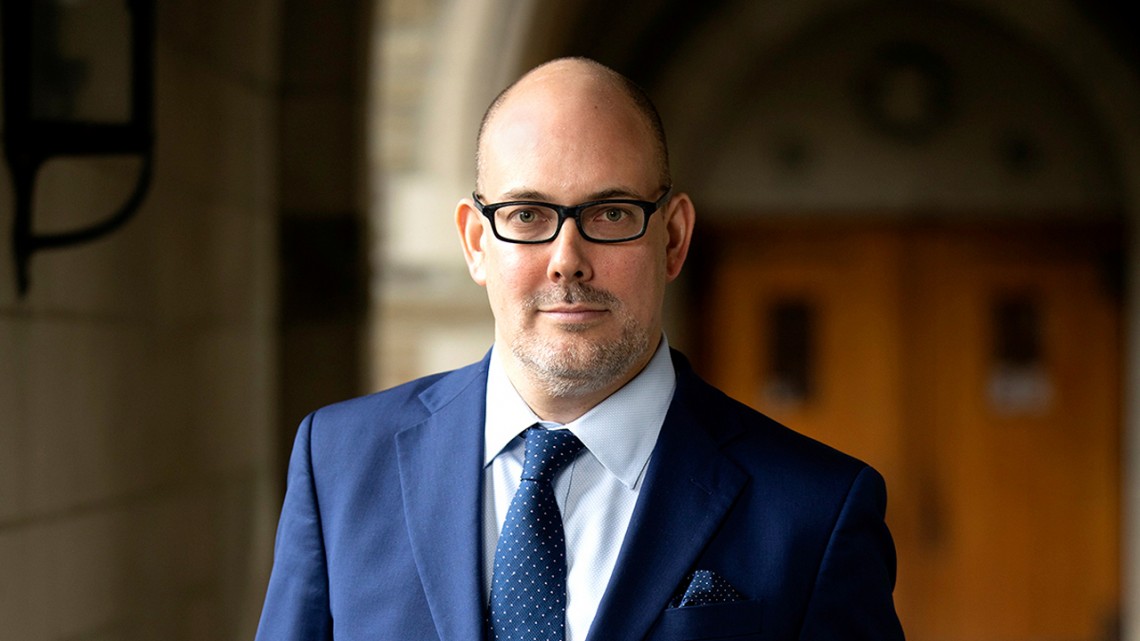
Jens David Ohlin has been named the Allan R. Tessler Dean of Cornell Law School, effective July 1.
Jens David Ohlin named dean of Cornell Law School
By Tom Fleischman
Jens David Ohlin, who has served as interim dean of Cornell Law School since January and as a member of the faculty since 2008, has been named the Allan R. Tessler Dean, effective July 1.
Ohlin – whose scholarly work spans criminal law, criminal procedure, public international law and the laws of war – will become the Law School’s 17th dean, succeeding Eduardo Peñalver ’94, who stepped down in December and will become president of Seattle University on July 1.
The Cornell Board of Trustees Executive Committee voted to approve the appointment June 10.
“Jens has an exciting vision for the Law School and the depth of his legal scholarship, combined with his experience as vice dean and in other key leadership positions, makes him uniquely qualified to take on this responsibility,” Provost Michael I. Kotlikoff said. “He’s been a tremendous asset to the Law School, and I’m excited to see him continue as dean.”
Ohlin previously served as vice dean (2017-20), associate dean for academic affairs (2015-17) and director of faculty research (2013-15). He said he feels fortunate to take on this position “at such an optimistic moment” for the school.
“I love the university, I love the Law School and I love my colleagues, and nothing could make me happier than to take on this new responsibility,” Ohlin said. “It’s a labor of love during a very important transitional moment for us. We’re coming out of a difficult time nationally in terms of the pandemic, and there have been a lot of changes in very quick succession.”
Ohlin noted the Law School’s many recent accomplishments, including fundraising aimed at strengthening the school’s financial aid capabilities and greatly reducing student debt; the recruitment and retention of faculty; and the launch of two new degree programs – the LL.M. program at Cornell Tech and a new online Master of Science in Legal Studies for business professionals.
He’s also looking forward to meeting with the faculty and collectively setting new goals.
“I want to maintain all of the success that Eduardo and the Law School achieved during those seven years – in particular the great strides in lowering the debt burden for students as they graduate,” Ohlin said. “At the same time, I see this as an opportunity to focus on some other things, as well.”
Among his aspirations, he said, are increasing the school’s focus on environmental law, as well as election and voting-rights law.
“Those are areas we can explore,” he said, “not only because they involve excellence in legal research, which is at the core of what we do, but also because they’re very much connected with our land-grant mission of public service to the community.”
Among the courses Ohlin has taught are Criminal Law and Public International Law. In addition to publishing dozens of articles, he has authored, co-authored or co-edited 16 books, including “Defending Humanity: When Force is Justified and Why” (2008), “Election Interference: International Law and the Future of Democracy” (2020) and “Defending Democracies: Combating Foreign Election Interference in a Digital Age” (2021).
Ohlin has received five academic degrees, including a Ph.D. in philosophy from Columbia University in 2002, and a law degree from Columbia Law School in 2005. His broad academic background, including training in both philosophy and law, gives him the ability to see things in both the abstract and the concrete, he said.
“I’ve often approached things from a very philosophical perspective,” he said, “but then because of my legal training, I’m also very interested in seeing how those ideas play out on the ground, in terms of the resolution of legal issues. And it’s the combination of those two things that has always fascinated me – the connection between theory and practice.”
And he said it’s not just his academic background that has shaped his view of the law; it’s also the 13 years he’s spent teaching and doing research in Myron Taylor Hall.
“I’ve been very influenced by what I view as foundational at Cornell Law School, which is combining ambitious legal theories at the highest level with a commitment to understanding how the law operates on the ground, and also training students for a career in legal practice,” he said. “And it’s not just having both of those things in the building at the same time, but having both of those things connected in what every person does.”
Media Contact
Get Cornell news delivered right to your inbox.
Subscribe
